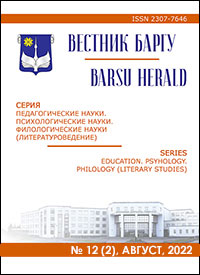COGNITIVE INDEPENDENCE OF FOREIGN STUDENTS: CONTENT, STRUCTUREAND FEATURES OF DEVELOPMENT (ON THE EXAMPLE OF THE DISCIPLINE“RUSSIAN AS A FOREIGN LANGUAGE”)
Keywords:
cognitive independence; heuristic learning; pedagogical silence; Russian as a foreign languageAbstract
The article is devoted to the problem of the cognitive independence development of foreign students, the actualization
of which is associated with changes in the understanding of the goals of education, according to which learning should not be limited to the communication of knowledge, but should develop the necessary competencies in the implementation
of independent cognitive activities and reveal the creative potential of students. The introduction substantiates the urgency of this problem. The main part provides a more precise definition of the cognitive independence of foreign students, describes its component structure and content, the features and pedagogical conditions of its development. In the end, a conclusion is made about the specificity of the process of developing the cognitive independence of
foreign students when teaching Russian as a foreign language and about the need for an integrated approach to its development.
The research materials can be used in organizing the educational process, for methodological work in an educational institution, as well as in self-educational pedagogical activity.
Ref.: 14 titles.
Downloads
Published
Issue
Section
License
Copyright (c) 2023 Вестник БарГУ Серия "Педагогические науки. Психологические науки. Филологические науки"
Это произведение доступно по лицензии Creative Commons «Attribution-NonCommercial» («Атрибуция — Некоммерческое использование») 4.0 Всемирная.
Авторы сохраняют за собой право заключать определенные договорные соглашения, касающиеся неисключительного распространения опубликованной версии работы (например, размещать ее в институциональном репозитории, публикация в книге) со ссылкой на ее первоначальную публикацию в этом журнале.





